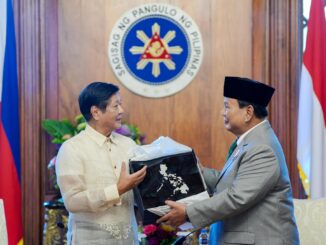
MANILA, Philippines — President Ferdinand Marcos Jr. approved the additional P1-billion budget for the Philippine Coconut Authority’s (PCA) project to plant 100 million coconut trees in the country, Malacañang said Tuesday.
The President gave the greenlight to more budget for the massive planting/replanting and fertilization programs of the coconut industry during the sectoral meeting in Malacañang on Tuesday.
During the meeting, the President also approved the proposal of the PCA to increase to P2.5 billion in 2025 the fertilization program of the coconut planting project.
President Ferdinand Marcos Jr. presides during the sectoral meeting at the Malacañang Palace on Tuesday, August 27, 2024. KJ ROSALES/PPA POOL
“So that’s why I’m focusing on the production side and that’s what we have to increase. The critical part of that is the replanting,” the President said.
PCA Administrator Dexter Buted said the additional budget of P1 billion will enable the agency to plant the 15.3 million trees in 2025.
Under the Philippine Coconut Industry Development Plan 2024-2034 (PCIDP 2024-2034), the PCA will plant/replant a total of 100 million coconut seedling in 700,000 hectares of land by 2028 all over the country to increase coconut production by 4.7 billion valued at P33.1 billion by 2034.
For this year, the PCA will plant 8.5 million seedlings, 15.3 million seedlings in 2025, and 25.4 million every year from 2026 to 2028.
The President pointed out the replanting program was an important project because of the industry’s potential.
“That’s why we still maintain our very high position in terms of coconut products exports because despite the fact that we have neglected the coconut industry over so many years, we still, I think we’re number one pa rin,” Marcos said.
“And despite the fact that we are really working with very limited raw material because nga hindi nag-replant puro matanda na ‘yung mga trees natin (we did not replant and our trees are old). That’s why this replanting is important,” he added.
The President said there was a big market for coconut products as he expected the private sector to buy all the supply “because the market is so large and growing” and the industry has not reached the market’s limit on coconut product demand.
The Department of Agriculture will also implement intercropping while farmers wait for the trees to become productive. Among the crops that will be planted include coffee, cacao and bananas.
The President also ordered the PCA to work closely with the Cooperative Development Authority to consolidate farmers’ groups and associations to enable them to implement the massive planting/replanting program.
The 10-year PCIDP plan was developed to address the critical constraints of the low growth rate of the coconut industry in terms of production, low nut yield due to ageing coconut tree population, natural calamities, pests and diseases, poor farming and insufficient budget allocation.
To implement the plan, the PCA has proposed a budget amounting to P102.02 billion within the 10-year period to cover the implementation, monitoring, and evaluation of the PPAs.
Farmers also have meager incomes due to their very limited participation in the coconut value chain and inability to diversify to other coconut products aside from copra.
Current programs and projects in the industry are the development of hybrid coconut seed farms, nursery for planting and replanting, and research; training of farmers and their families, research, marketing, promotion; crop insurance; credit programs; infrastructure development; scholarship program; and health and medical program.
There are also farm improvements through diversification and/or intercropping, shared facilities for processing; as well as empowerment of coconut farmers’ organization and their cooperatives.
The Philippine coconut industry has contributed $3.22 billion to the country’s export earnings in 2022. The figure is 43 percent of the country’s total agricultural exports.





Be the first to comment